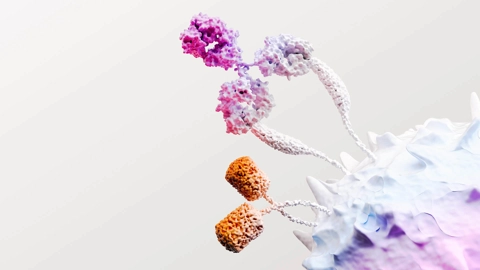Ojjaara (momelotinib) approved in Canada for the treatment of myelofibrosis in adults who have moderate to severe anemia
- Ojjaara (momelotinib) is the only approved treatment for newly diagnosed and previously treated myelofibrosis patients[i] who have moderate to severe anemia and other key manifestations associated with the disease.[ii]
- This approval underscores GSK’s commitment to help drive progress for people living with complex blood cancers.
MISSISAUGA, ON - GSK announced today that Health Canada has approved Ojjaara (momelotinib) for the treatment of splenomegaly and/or disease-related symptoms, in adult patients with intermediate or high-risk primary myelofibrosis (MF), post polycythemia vera MF or post essential thrombocythemia MF who have moderate to severe anemia.[iii] Ojjaara is the first and only approved medication globally, and now in Canada, that treats both the anemia and other key manifestations of myelofibrosis (newly diagnosed and previously treated).[iv]
“Treatment options for myelofibrosis-related anemia have been limited. We are proud to offer this treatment alternative for Canadian patients to address this critical unmet need and other myelofibrosis symptoms. With most myelofibrosis patients becoming anemic over time, Ojjaara’s approval represents a significant milestone to improve the outcomes of these patients while also highlighting GSK’s commitment to making an impact in Canada’s hematology oncology space through innovative new treatments,” said Michelle Horn, Interim Country Medical Director, GSK Canada.
Myelofibrosis is a rare blood cancer part of the broader myeloproliferative neoplasms (MPNs) diseases. MPNs have an incidence rate of 2.05 new cases per 100,000 Canadians.[v] Currently there are between 1,400-2,177 estimated people living with this type of disease in Canada.[vi] Anemia is a common symptom of myelofibrosis and a major unmet need[vii], but awareness among Canadians is low. A 2024 survey shows that 90% of Canadians have heard of anemia but almost 50 per cent do not know about blood cancer related anemia.[viii] Canadians also have low knowledge of anemia with over 40 per cent of the same respondents saying they know little to nothing about this condition.[ix]
“Anemia and related transfusions significantly affect the quality of life, prognosis and survival for anemic myelofibrosis patients,” said Cheryl Petruk, CEO of HEAL Canada. “We are excited to witness progress in this rare disease space and to see Ojjaara approved in Canada. This new treatment has the potential to help improve the lives of patients while addressing the disease’s main challenges, namely anemia and other major symptoms.”
Ojjaara is the only once-a-day, oral JAK1/JAK2 and activin A receptor type 1 (ACVR1) inhibitor.[x] The approval of Ojjaara by Health Canada is supported by data from the pivotal MOMENTUM Phase III trial, which demonstrated significant improvements in Total Symptom Score (TSS), Transfusion Independence, and Splenic Response Rate.[xi] Additional support came from a subset of patients in the SIMPLIFY-1 Phase III trial, reinforcing Ojjaara’s efficacy in treating moderate to severe anemia and related symptoms in myelofibrosis patients.[xii]
About Myelofibrosis
Myelofibrosis is a condition where too many blood cells are produced in the bone marrow – the spongy insides of bone where blood cells develop, causing scar tissue to build up in the marrow, eventually leading to a decrease in normal red blood cells, white blood cells, and platelets production.[xiii] To compensate, the spleen and liver may enlarge as these organs take on the role of making more blood cells. [xiv] In Canada, 1,400 to 2,177 patients have been diagnosed with myelofibrosis.[xv] It is typically diagnosed in people between 50 and 80 years old but can occur at any age.[xvi]
Anemia in Myelofibrosis
Anemia is one of the most common and serious complications of myelofibrosis and is often associated with poor overall survival, reduced quality of life, and the need for frequent blood transfusions. [xvii],[xviii],[xix] Nearly all people with myelofibrosis are estimated to develop anemia over the course of the disease.[xx] Research has shown that over 32% of patients with myelofibrosis taking a current available JAK inhibitor will discontinue treatment due to anemia. [xxi]
About the pivotal MOMENTUM clinical trial[xxii]
MOMENTUM was a phase III, global, multicentre, randomised, double-blind study investigating momelotinib versus danazol in patients with myelofibrosis who were symptomatic and anemic and had been previously treated with an approved JAK inhibitor. The trial was designed to evaluate the safety and efficacy of momelotinib for treating and reducing key hallmarks of the disease: symptoms, blood transfusions (due to anemia) and splenomegaly. Results from the 24-week treatment period were presented at the 2022 American Society of Clinical Oncology (ASCO) Annual Meeting and subsequently published in The Lancet.
About the SIMPLIFY-1 clinical trial[xxiii]
SIMPLIFY-1 was a multicentre, randomised, double-blind, phase III study that compared the safety and efficacy of momelotinib to ruxolitinib in patients with myelofibrosis who had not received prior treatment with a JAK inhibitor. Safety and efficacy results for SIMPLIFY-1 were based upon a subset of patients with moderate to severe anemia (haemoglobin <10 g/dL) at baseline. The efficacy of momelotinib in the treatment of patients with myelofibrosis in SIMPLIFY-1 was based on spleen volume response (reduction by 35 per cent or greater).
About Ojjaara (momelotinib)[xxiv]
Ojjaara has a differentiated mechanism of action, with inhibitory ability along three key signalling pathways: Janus kinase (JAK) 1, JAK2, and activin A receptor, type I (ACVR1). Inhibition of JAK1 and JAK2 may improve constitutional symptoms and splenomegaly. Additionally, inhibition of ACVR1 leads to a decrease in circulating hepcidin, which is elevated in myelofibrosis and contributes to anemia.
Please consult the Product Monograph at www.gsk.ca for complete safety information. The Product Monograph is also available by calling 1-800-387-7374.
About the Blood Cancer Survey
The Blood Cancer Survey was an online survey of 1,524 Canadians aged 18 and over, conducted in September 2024 and funded by GSK.[xxv] Data were collated from two questions covering awareness and understanding of anemia and the symptoms of blood cancer with all participants agreeing to participate in full transparency on both the source of the data commissioning, and to the use of their anonymized data. [xxvi]
GSK in Oncology
GSK is committed to maximising patient survival through transformational medicines, with a current focus on breakthroughs in immuno-oncology and tumour-cell targeting therapies, and development in haematologic malignancies, gynaecologic cancers and other solid tumours.
About GSK
GSK is a global biopharma company with a purpose to unite science, technology, and talent to get ahead of disease together. For further information please visit www.ca.gsk.com/en-ca.
References
[i] OJJAARA Canadian Product Monograph
[ii] Harrison C, et al. Presented at: European Hematology Association; June 2022. Poster EP1113.
[iii] OJJAARA Canadian Product Monograph
[iv] Harrison C, et al. Presented at: European Hematology Association; June 2022. Poster EP1113.
[v] Heppner J, Nguyen LT, Guo M, Naugler C, Rashid-Kolvear F. Incidence of myeloproliferative neoplasms in Calgary, Alberta, Canada. BMC Res Notes. 2019;12(1):286.
[vi] Heppner et al. BMC Res Notes (2019) 12:286.
[vii] Naymagon L, Mascarenhas J. Myelofibrosis-Related Anemia: Current and Emerging Therapeutic Strategies. Hemasphere. 2017 Dec 20;1(1):e1. doi: 10.1097/HS9.0000000000000001. PMID: 31723730; PMCID: PMC6745971.
[viii] GSK Data on File: Blood Cancer Research Survey. September 2024.
[ix] Ibid.
[x] OJJAARA Canadian Product Monograph
[xi] Verstovsek S, et al. MOMENTUM: momelotinib vs danazol in patients with myelofibrosis previously treated with JAKi who are symptomatic and anemic. Future Oncol. 2021;17(12):1449-1458.
[xii] Mesa RA, Kiladjian JJ, Catalano JV, Devos T, Egyed M, Hellmann A, McLornan D, Shimoda K, Winton EF, Deng W, Dubowy RL, Maltzman JD, Cervantes F, Gotlib J. SIMPLIFY-1: A Phase III Randomized Trial of Momelotinib Versus Ruxolitinib in Janus Kinase Inhibitor-Naïve Patients With Myelofibrosis. J Clin Oncol. 2017 Dec 1;35(34):3844-3850. doi: 10.1200/JCO.2017.73.4418. Epub 2017 Sep 20. PMID: 28930494; PMCID: PMC6553796.
[xiii] The Chronic Myelogenous Leukemia Society of Canada. Myelofibrosis – FACT Sheet. Available at: https://cmlsociety.org/myelofibrosis-fact-sheet/#_edn8 Accessed on October 1, 2024.
[xiv] Ibid.
[xv] Heppner et al. BMC Res Notes (2019) 12:286.
[xvi] The Leukemia & Lymphoma Society. Idiopathic myelofibrosis. 2007. Available at https://www.lls.org/sites/default/files/file_assets/FS14_Myelofibrosis_Fact%20Sheet_Final9.12.pdf (340 KB) Accessed on October 1, 2024.
[xvii] Naymagon, L, Mascarenhas, J. Myelofibrosis-Related Anemia: Current and Emerging Therapeutic Strategies. HemaSphere. 2017;1(1):e1.
[xviii] Verstovsek S, et al. MOMENTUM: momelotinib vs danazol in patients with myelofibrosis previously treated with JAKi who are symptomatic and anemic. Future Oncol. 2021;17(12):1449-1458.
[xix] Kuykendall AT, Shah S, Talati C, et al. Between a rux and a hard place: evaluating salvage treatment and outcomes in myelofibrosis after ruxolitinib discontinuation. Ann Hematol. 2018;97(3):435-441.
[xx] Naymagon L, Mascarenhas J. Myelofibrosis-Related Anemia: Current and Emerging Therapeutic Strategies. Hemasphere. 2017 Dec 20;1(1):e1. doi: 10.1097/HS9.0000000000000001. PMID: 31723730; PMCID: PMC6745971.
[xxi] Kuykendall AT, Shah S, Talati C, et al. Between a rux and a hard place: evaluating salvage treatment and outcomes in myelofibrosis after ruxolitinib discontinuation. Ann Hematol. 2018;97(3):435-441.
[xxii] Verstovsek S, et al. MOMENTUM: momelotinib vs danazol in patients with myelofibrosis previously treated with JAKi who are symptomatic and anemic. Future Oncol. 2021;17(12):1449-1458.
[xxiii] Mesa RA, Kiladjian JJ, Catalano JV, Devos T, Egyed M, Hellmann A, McLornan D, Shimoda K, Winton EF, Deng W, Dubowy RL, Maltzman JD, Cervantes F, Gotlib J. SIMPLIFY-1: A Phase III Randomized Trial of Momelotinib Versus Ruxolitinib in Janus Kinase Inhibitor-Naïve Patients With Myelofibrosis. J Clin Oncol. 2017 Dec 1;35(34):3844-3850. doi: 10.1200/JCO.2017.73.4418. Epub 2017 Sep 20. PMID: 28930494; PMCID: PMC6553796.
[xxiv] OJJAARA Canadian Product Monograph
[xxv] GSK Data on File: Blood Cancer Research Survey. September 2024.
[xxvi] Ibid.

